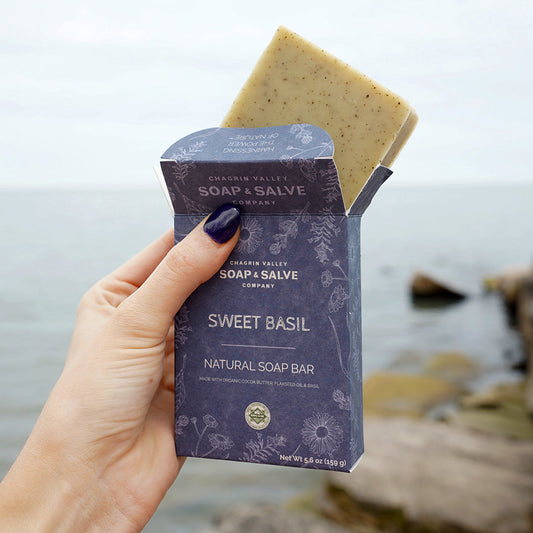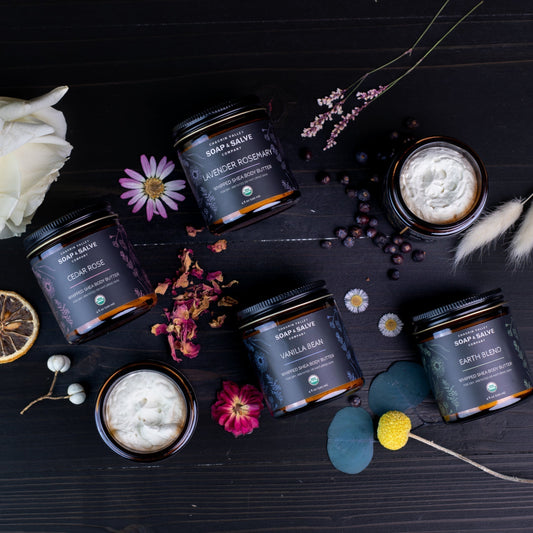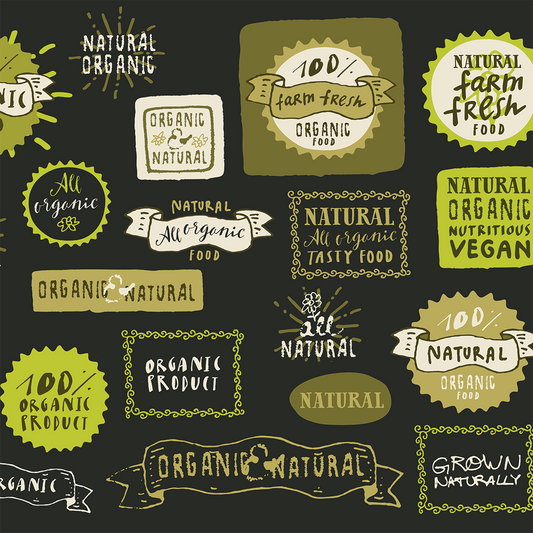Rules For Labeling "Organic" Soap
We received an email from a customer with a link to another company claiming to sell “organic soap.”
"Their label says 'organic soap' right on the front and yours only says 'Made with certified organic Lavender, Coconut Milk and Shea Butter.' So I assume that your soap is not really organic."
This email highlights a major problem in the soap and skincare industry: the misleading use of the word organic.
 It's no secret that “organic” is one of the most powerful (and popular) marketing terms in personal care products today.
It's no secret that “organic” is one of the most powerful (and popular) marketing terms in personal care products today.
But in the U.S., organic is more than a feel-good term. It is a legal term, defined and regulated by the USDA’s National Organic Program (NOP).
The NOP has strict rules for how the term “organic” can be used on product labels, websites, and marketing materials.
The rules, based on organic agricultural and food standards, also apply to personal care products like natural soap. However, while the standards are clear, enforcement in the personal care industry is weak at best.
As a result, many skin care companies freely use the word organic on labels, websites, and even in their business names, without certification and without following the rules. The company mentioned in the customer’s email is just one example.
To truly understand the problem of organic labeling, we need to understand the rules.
So what should the word “organic” mean when it appears on a product label?
Let’s break down the USDA’s three official labeling tiers—and why real soap, even when made with organic ingredients, doesn’t always qualify for the label most people expect.
Organic Soap Labeling Rules
The USDA’s National Organic Program (NOP) has specific rules that define what makes a product “organic” and how it must be labeled. Within the NOP, there are three levels (or tiers) of organic certification. Classification is based on the percentage of organic ingredients in a product, excluding water and salt.
100% Organic

This means exactly what it says.
Products can only be labeled “100% Organic” if every ingredient (excluding water and salt) is certified 100% organic.
True bar soap is legally defined by the FDA and requires sodium hydroxide (lye) in the recipe.
Although no lye remains in a properly cured bar, it is still an essential ingredient, and organic lye does not exist.
So, despite using only organic oils, butters, herbs, and essential oils, no real soap qualifies for the “100% Organic” label.
So, there is no such thing as a “100% organic” soap.
Organic
Products can be labeled as "organic" if at least 95% to 99% of the ingredients are USDA certified organic (excluding water and salt).

The remaining 5% must consist of nonagricultural substances on the USDA-approved Ingredient List.
In the chemistry of natural soapmaking, sodium hydroxide accounts for about 8 to 15% of the total soap recipe (excluding water and salt).
Again, even though no lye remains in the finished product, the USDA requires it to be counted in the ingredient percentage. This is why even soaps made with 100% organic oils can not reach the 95% threshold—and cannot legally be labeled “Organic Soap.”
Since no real soap can be 95% organic, as a USDA Certified Organic company, we are not allowed to use the words "organic soap" on the label.
Another important point: Only certified products may use the word “organic” on their label. If a product is not USDA Certified Organic, the use of the word “organic” is not permitted—period.
(Note: In Europe, organizations like Ecocert do not count lye in the calculation, so some soaps can legally use the words “Organic Soap” on their label.)
Made With Organic . . . (Ingredients)
For consumers, this is the most misunderstood category. Products can be labeled "Made with Organic (ingredients)" if at least 70% organic ingredients are used (excluding water and salt). The remaining 30% must consist of nonagricultural substances on the USDA-approved ingredient List.

Even if all other ingredients in our soap and shampoo bars are certified organic, they would never have an organic content of more than 87% to 90% due to the sodium hydroxide.
So this 3rd tier is the correct labeling requirement for natural soap.
These products may display the certifying agent's logo but not the USDA organic logo.
Our certifying agency is OEFFA (The Ohio Ecological Food and Farm Association).
Their logo is displayed on our "organic" soaps and shampoos. We are also required to list from one to three organic ingredients on the label. For example, "Made With Organic Shea Butter, Coconut Oil, and Calendula."
Even though our soap can not call itself "organic soap" and can not carry the USDA Organic logo, it is still certified, meaning it must meet the same USDA standards for organic growing, production, handling, storage, and processing. That includes being free of toxic pesticides, GMOs, synthetic fertilizers, sewage sludge, and irradiation.
At Chagrin Valley Soap, we maintain a minimum organic content level of 87% in our bar soaps and shampoos, and we are certified by the OEFFA under the USDA National Organic Program.
But Some Companies Sell Soap With The USDA Organic Seal
We were told that a few soap companies claim to make 95% organic soap and use the word "organic" as well as the USDA symbol on their label and website. Please read our blog: "A Few Words About Organic Soap And Shampoo" to learn what we discovered.
So, was the customer right in questioning the labeling discrepancy?
Yes—but for the wrong reason.
Remember the USDA rules described above, there is no such thing as "organic soap." The company was using improper, misleading labels. The only "organic soap" a consumer can buy is certified "made with . . . organic ingredients," IF the company is certified organic.
Chagrin Valley soaps and shampoos have the 3rd tier of USDA organic certification, but the rule is, we cannot call our soap organic. Since we chose to go through the rigorous process of becoming a USDA Certified Organic company, we are required to follow every rule set by the National Organic Program. No vague claims. No shortcuts. Just honest labels, backed by real certification.
By now, you are probably asking why and how companies get away with misleading labels.
Some may simply not understand the rules. But many are fully aware—and they are taking advantage of the growing demand for organic products by using the word illegally to increase sales and build trust they have not earned. Why?
- The word "organic" appeals to consumers who prioritize these values.
- The "organic" label can lead to higher prices and increased sales which, increases profits.
And here is the frustrating part for our Company:
Unlike the food industry, there is no “organic police,” no governing body to enforce organic labeling in the personal care industry. This gray area allows misleading claims, false labeling, and improper advertising to slip through, putting our Certified Organic business at a disadvantage. It's not just about labels – it's about integrity and trust.
 I followed the link the customer shared and discovered that the company in question was not USDA Certified Organic, so no oversight, no accountability.
I followed the link the customer shared and discovered that the company in question was not USDA Certified Organic, so no oversight, no accountability.
Be An Informed Organic Consumer
Today’s consumers are increasingly seeking out organic products. While sales of conventional personal care items are rising by about 10% per year, organic personal care sales have surged by more than 20% annually.
Naturally, companies want a piece of that growth. In an attempt to ride the organic wave, many now market products as “organic.”
If a company uses the word “organic” on their label or website, but doesn’t have USDA Organic Certification, where’s the guarantee?
Are they actually selling organic products?
Or are they simply selling the word "organic"?
Meeting organic standards is not easy, and making truly organic products is not cheap. It is important to verify. Are a company’s products certified organic? OR, are their labels and marketing simply using the word organic to cash in on its popularity?
Without certification, there is no way to be sure.
Organic certification is the only system of accountability we have. It ensures that a product complies with strict standards for growing, sourcing, handling, and production. It means the ingredients are verified, the processes are documented, and the company is held responsible for its claims.
No certification? No proof. No accountability.
And technically, no right to use the word “organic” at all—at least not under USDA rules.
If you are looking for truly organic skincare, do not rely solely on marketing language; verify the product's certification and ingredients.
- Go behind the label
- Scrutinize the full ingredient list
- Look for the USDA Organic seal—or the words “Certified Organic by…” followed by the name of an accredited certifying agency
- Check the reputation of the company
That’s how you know it’s real.
Learn More Blog: Why We Became a USDA Certified Organic Company
Some Soaps Do Not Fit the Organic Criteria
Even if a soap or shampoo is made with certified organic ingredients and meets the same rigorous standards as those required for our "Made With Organic Ingredients" products, it can still fall outside USDA labeling rules if it contains certain non agricultural materials—like Dead Sea Mud, pumice, or bamboo charcoal—that are not on the NOP’s National List of Allowed and Prohibited Substances.
Why does this happen?
Unlike some other countries, in the US, organic certification for personal care products is built on the standards created for organic farming and agriculture.
There is no separate certification branch for soaps, shampoos, or cosmetics, so the list of approved non-agricultural ingredients is the very same one used for agricultural inputs.
 Clays such as kaolin and bentonite appear on the list because they have recognized agricultural uses (e.g., soil amendments).
Clays such as kaolin and bentonite appear on the list because they have recognized agricultural uses (e.g., soil amendments).
But ingredients like Dead Sea Mud, natural bamboo charcoal, and pumice aren’t used in standard farming practices, so they simply do not qualify.
What does this mean for labeling?
- Products containing these “unlisted” yet natural materials cannot display the USDA Organic seal or our OEFFA seal.
- We are allowed to use the word "organic" to describe certified organic ingredients in our ingredient lists.
- Based on USDA rules, these bars are not permitted to use the word “organic” in their name or show any type of organic seal.
At Chagrin Valley Soap & Salve, we are a USDA Certified Organic company—and that means we must follow all of the NOP’s rules, even when they feel overly restrictive for personal care formulations.
Ultimately, this ensures you know exactly where we stand: we play by the book, and our “Made With Organic Ingredients” soaps are certified, transparent, and true to the organic standards we believe in.
Organic Soap Labeling Conclusion
Understanding the rules for organic labeling isn’t just about decoding legal jargon—it’s about protecting yourself from misleading marketing and making informed choices that align with your values. The word organic should mean something. At Chagrin Valley, it does.
We believe transparency matters. That’s why we follow the strict USDA organic standards, even when it’s hard, and why we never use the word "organic" unless we’ve earned the right to. While many companies rely on unregulated claims, we rely on trust, certification, and ingredients you can actually recognize.
So the next time you see the word organic on a soap or skincare product, take a closer look. Ask questions. And remember—you deserve the truth about what you put on your skin.
Take the Guesswork Out of Organic Claims
The USDA has an Organic Integrity Database that provides information about certified organic operations. It’s a great tool to help consumers find trusted suppliers and verify the organic status of products. To use it, simply type the name of a company into the blank space under “Operation Name” and hit return.

Find the Perfect Organic Soap for You
What Do All of the Organic Labels Mean?
A Few Words About Organic Soap and Shampoo
Why Did We Become a Certified Organic Company
This blog, originally published June 5, 2014, has been updated for content





